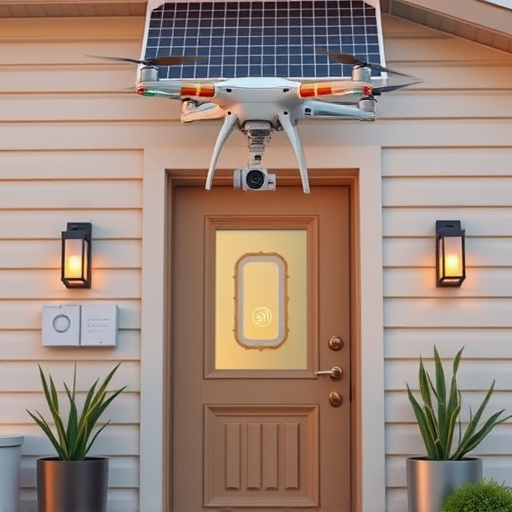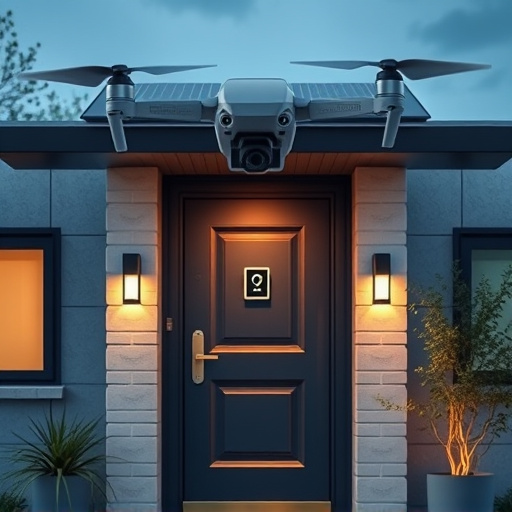The future of home security is being defined by a surge in innovative security technologies, creating an integrated and advanced protective landscape. Emerging advancements like smart home systems, biometric access control, encryption protocols, and quantum cryptography are transforming homes into high-tech fortresses. Driven by AI, machine learning, and sensors, these cutting-edge solutions offer unparalleled protection, securing communications from hackers. With rapid progress in future security trends, technology is shaping a safer, more connected living environment characterized by intuitive user interfaces and comprehensive home protection.
The future of home security is an evolving landscape driven by technological innovations. As our homes become smarter and more connected, emerging technologies are transforming how we protect our personal spaces. From AI-driven threat predictions to biometric access control, this article explores the cutting-edge security solutions shaping tomorrow’s homes. Discover how IoT devices, enhanced surveillance, wireless locks, and AI-powered assistants will redefine safety, offering both peace of mind and unprecedented control over our living environments.
- Emerging Home Protection Technologies: Unlocking the Future
- – Smart Home Integration: The Core of Future Security
- – AI and Machine Learning: Predicting and Preventing Threats
Emerging Home Protection Technologies: Unlocking the Future

The future of home security is an exciting landscape filled with innovative technologies that promise to revolutionize how we protect our spaces. Emerging advancements in security technology are unlocking new possibilities, transforming homes into intelligent fortresses. Smart home security systems are at the forefront of this revolution, leveraging artificial intelligence and machine learning to anticipate and respond to potential threats. These cutting-edge solutions integrate various sensors, cameras, and automated devices, creating a comprehensive surveillance network that detects anomalies and alerts homeowners instantly.
From biometric access control to advanced encryption protocols, these emerging home protection technologies offer unprecedented levels of security. Facial recognition, fingerprint scanners, and even retinal scan systems are becoming standard features in high-end homes, ensuring only authorized individuals gain entry. Additionally, quantum cryptography promises to secure communication channels, making it nearly impossible for hackers to intercept sensitive data. With such rapid progress, the future looks bright for home security, where technology advancements will continue to shape a safer and more connected living environment.
– Smart Home Integration: The Core of Future Security

The future of home security is intricately tied to the integration of smart home technologies, forming the core of what’s to come in innovative protection solutions. As homes become increasingly connected, devices and systems will work together seamlessly to provide comprehensive security. This interconnectedness enables features like automated alerts, remote access, and intelligent monitoring, enhancing both detection capabilities and response times.
Emerging home protection technologies will leverage advanced artificial intelligence (AI) and machine learning algorithms to analyze patterns, recognize anomalies, and predict potential threats. Smart cameras with facial recognition, voice-activated door locks, and integrated security systems will become commonplace, offering cutting-edge security solutions that adapt to the needs of modern households. These advancements in security technology promise a future where homes are not just protected but actively monitored and secured through intuitive, user-friendly interfaces.
– AI and Machine Learning: Predicting and Preventing Threats

The integration of Artificial Intelligence (AI) and Machine Learning (ML) is poised to revolutionize future home security, enabling more proactive and intelligent protection. These technologies can analyze vast amounts of data from various sensors and cameras to predict potential threats and take preventive measures. By learning patterns and behaviors, AI algorithms can identify anomalies that might indicate a break-in attempt or even internal security risks. This predictive capability allows for swift responses, enhancing the overall safety of homes.
Emerging home protection solutions powered by AI and ML are expected to offer personalized security profiles, adaptive to individual routines and preferences. They will learn about family members’ schedules, habits, and common activities, enabling them to automatically adjust security settings accordingly. This level of customization ensures that security technology advancements keep up with the dynamic nature of modern lifestyles, providing cutting-edge security solutions for a safer future home environment.






